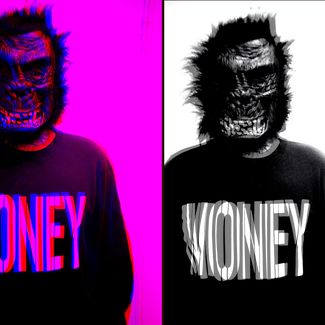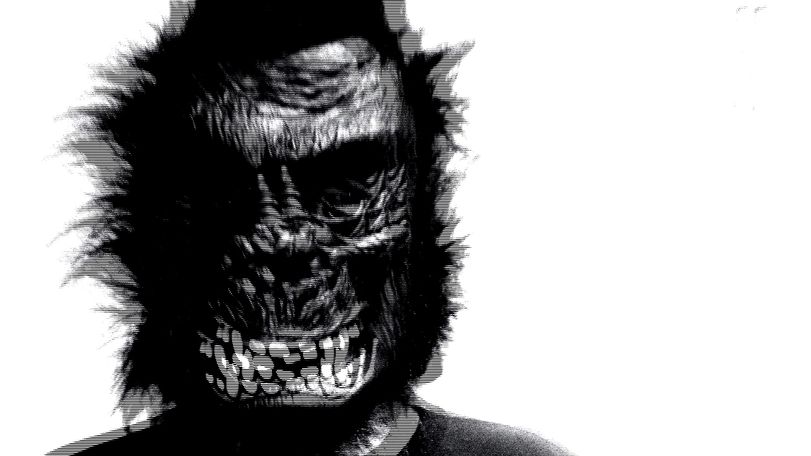
my creative life
Punk posters, Vaughan Williams and HBO classic: St Luke's Alan Young on his muses
The St Luke's chief creative officer shares three creative inspirations that set his heart alight
26 October 2022
Print: Simon Thompson's print, Self Fucking Evil
Twelve years ago, I bought a print by Simon Thompson. I spotted it in the old Aquarium Gallery in Fitzrovia. A piece of typographic design that reads 'TOO MUCH ART WILL KILL YOU. At the time, my wife was deeply embroiled in her PhD research on the Tate Galleries. It made her an apt birthday present and started me collecting more of Simon’s work.
The one featured is a screen-printed self-portrait of the artist wearing a gorilla mask and a sweatshirt emblazoned with the word 'MONEY' (above and below).
I liked these prints so much I bought two to stand side-by-side. They have the violent energy of punk rock posters - punchy, unignorable and a powerful reminder for us all in commercial creativity; yes, we want money – we also know if we want it too badly, we’ll quickly end doing bad work for bad clients. In short, Money will made monkeys of us. An old St. Luke’s maxim is; Money is like oxygen, we need it but it’s not what we live for.
Simon’s prints also remind me that creativity isn’t always a case of “you get what you pay for”, excellent creativity can often cost less money than poor creativity – because great, photographers, film makers and composers frequently offer their services for less money on a great project and, equally, will demand far more to produce a result they know will be so-so.
Music: Ralph Vaughn Williams Fantasia on a Theme by Thomas Tallis
After a performance, Bertolt Brecht, the great 20th Century Theatre Practitioner, was approached and asked: “Mr Brecht, how is it that all of your productions feels so new?” He answered words to the effect of: “I am not in the business of the new, I merely try to recall what has been forgotten.”
Creative people know that the history of art, music and literature is long, and that means there is much to be recalled. The piece of music I choose is Ralph Vaughn Williams Fantasia on a Theme by Thomas Tallis.
It’s based on a hymn written in early Tudor times then arranged some 400 years later by Williams to powerful effect. He made it his business to find beautiful, forgotten music and show it to be relevant again. Here, Tallis’ original, simple choral melody is replaced, by rich sweeping orchestrations that explore different arrangements and time signatures. Many of us will know it from the man overboard scene in Master and Commander released in 2003 and it’s been re-recorded over 60 times since Williams debuted it, including once again in 2022. There are those who recognise there is always something new to be re-expressed in the old.
TV series: The Sopranos, season one
When a project suffers setbacks or repeated rejections, it’s easy to give up on it emotionally - even totally. David Chase worked on his script for The Sopranos for 12 years. Suffering setback after setback and rejection after rejection. But rather than quitting, Chase saw this as time he could harness to improve and hone the work.
When HBO eventually screened it 1999, he had 13 episodes, nearly 11 of hours of dramatic perfection. Each one full of intricately intertwined sub-plots, some plots lasting an episode some carried across many, but overarching all 13 is the main storyline that is classically Greek in its nature. Livia wants to kill Tony. A mother seeks to murder her own son.
You don’t knock out a story like that in couple of weeks, or months. It takes years and David Chase had the vision to use every day of delay an opportunity to make it better.
Alan Young is chief creative officer at St Luke's




